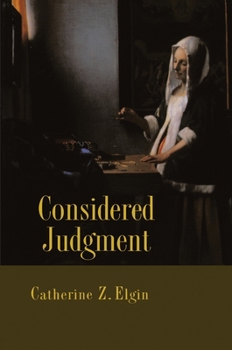Considered Judgment
Select Format
Select Condition 
Book Overview
Philosophy long sought to set knowledge on a firm foundation, through derivation of indubitable truths by infallible rules. For want of such truths and rules, the enterprise foundered. Nevertheless, foundationalism's heirs continue their forbears' quest, seeking security against epistemic misfortune, while their detractors typically espouse unbridled coherentism or facile relativism. Maintaining that neither stance is tenable, Catherine Elgin devises...
Format:Paperback
Language:English
ISBN:0691005230
ISBN13:9780691005232
Release Date:February 1999
Publisher:Princeton University Press
Length:240 Pages
Weight:1.05 lbs.
Dimensions:0.6" x 6.0" x 9.1"
Customer Reviews
1 rating
Epistemology done very well
Published by Thriftbooks.com User , 22 years ago
For those who find modern philosophy a rather pointless affair, this book may offer some relief. Elgin offers some hope for understanding the roots of human knowledge by finding a difficult but satisfying middle path between impossible certainty and excessive relativism. Elgin reviews the notion of "foundationalism," the traditional philosophical search for a certain foundation for human knowledge, and like most modern philosophers finds it to have failed. She then reviews the modern notion of knowledge arising from language games and the notion that it is socially constructed, and finds some redeeming value in that but also finds that we don't actually entirely work that way when we accumulate understanding of a topic, especially in science.Her middle ground is a "reflective equillibrium" that we seem to come to by maximimizing the collective tenability of a set of beliefs. We examine the implications of our own beliefs after ascribing some initially tenable beliefs, and we correct incorrect assumptions in an incremental process. Because of this we don't have to assume foundational beliefs that must be absolutely accurate, and we don't have to assume that beliefs are purely relative to social groups. Perhaps her most important and practical conclusion is that "knowledge" as we intuit the concept in terms of accumulating truths is not what we really gain from our experience as much as we gain "understanding." Her most interesting sections are where she argues effectively that emotion, metaphor, and other sources of understanding traditionally often excluded as knowledge are actually essential parts of human understanding. They orient us by shifting patterns of attention and revealing what is salient in an example. This potentially makes art and literature a source of understanding by giving epistemic access just as scientific experiments do. The downside of Elgin's argument is that she doesn't tie it into science as well as I would have liked, such as showing why we find some beliefs initially tenable and not others, or how the process of reflective equillibrium can be distinguished by its neurological or psychological faculties from other kinds of process. She also offers little in the way of empirical tests to distinguish her view from others (she addresses a specific critique of her idea by Stephen Stich, but not a test for resolving it).As philosophy that is readable by the non-philosopher, this is very well done and gives me some hope that some sort of common-sense and even useful ideas do arise in academic philosophy from time to time that can have application to daily life. While in retrospect there is little that is really revolutionary here, it is very satisfying to read something about human thinking that represents us as having a potential for rationality and well-founded beliefs as well as giving a possible way for different kinds of understanding to be reconciled. This is a very sane and grounded epistemology as far as i






